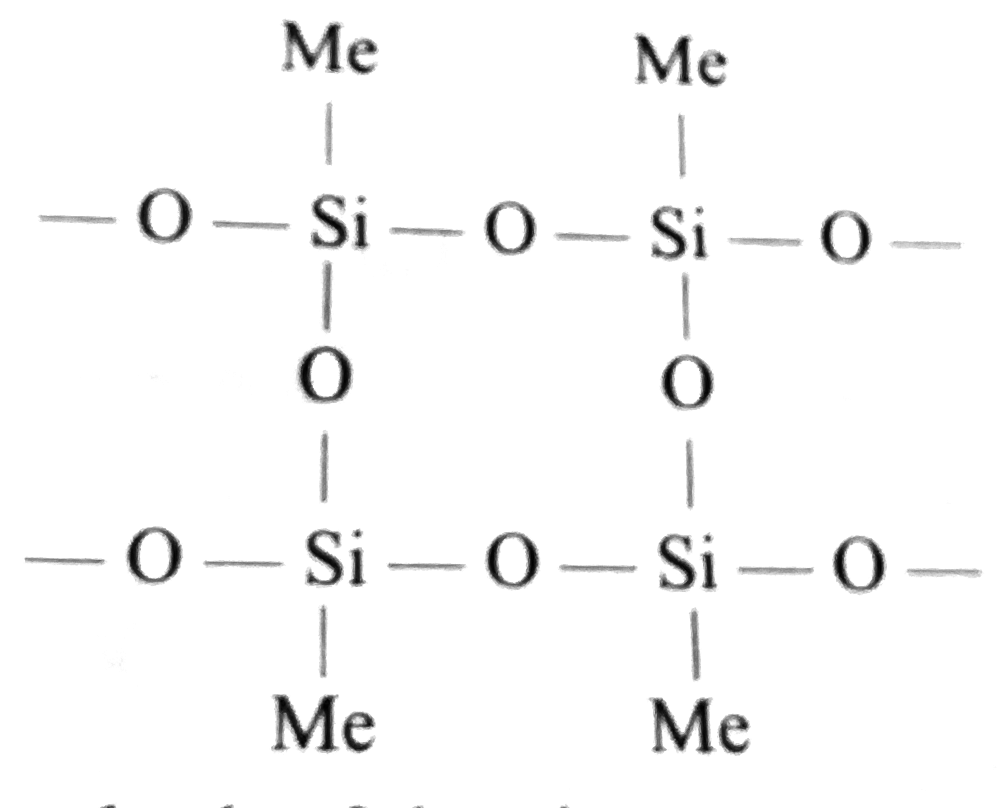Silicones are sunthetic polyners conitainging repeated R2SiO units . Since the empirical formula is that of a ketone (R2CO), the name Silicone has eeen given to these materils . Siliconse can be makde intio oils , rubbery eleastomers and resins . They find a varely of appoications because of their chemical inctness , water repelling nature m heat resistance and good electical insulationg property .
Commerical silicon polumers are usuallly metghly synthesised by the hudroluysis of
R2SiCl2[R=Methyl(Me)orphenyl(ϕ)]
![Silicones are sunthetic polyners conitainging repeated R2 SiO units . Since the empirical formula is that of a ketone (R2 CO), the name Silicone has eeen given to these materils . Siliconse can be makde intio oils , rubbery eleastomers and resins . They find a varely of appoications because of their chemical inctness , water repelling nature m heat resistance and good electical insulationg property . Commerical silicon polumers are usuallly metghly synthesised by the hudroluysis of R2 SiCl2 [R = Methyl (Me ) or phenyl ( phi)] . If we mix SiMe3Cl with SiMe2Cl2 , we get silicones of the type .](https://d10lpgp6xz60nq.cloudfront.net/physics_images/KSV_INORG_CHM_P1_C07_E01_033_Q01.png) .
.
If we mix SiMe3Cl with SiMe2Cl2 , we get silicones of the type .


both of the above
none fo the above
The correct Answer is:A
SiMe3ClH2OSiMe3OH
SiMe2Cl2H2O/(→)SiMe2(OH)2
(##KSV_INORG_CHM_P1_C07_E01_078_S01.png" width="80%">
Topper's Solved these Questions
- P-BLOCK GROUP 14 - CARBON FAMILYBOOK - CENGAGE CHEMISTRYCHAPTER - P-BLOCK GROUP 14 - CARBON FAMILYEXERCISE - Exercises (Multiple Correct )
19 Videos
- P-BLOCK GROUP 14 - CARBON FAMILYBOOK - CENGAGE CHEMISTRYCHAPTER - P-BLOCK GROUP 14 - CARBON FAMILYEXERCISE - Exercises (Single Correct)
83 Videos
- P-BLOCK GROUP 14 - CARBON FAMILYBOOK - CENGAGE CHEMISTRYCHAPTER - P-BLOCK GROUP 14 - CARBON FAMILYEXERCISE - Ex (Objective)
19 Videos
- P-BLOCK GROUP 13 - BORON FAMILYBOOK - CENGAGE CHEMISTRYCHAPTER - P-BLOCK GROUP 13 - BORON FAMILYEXERCISE - Exercise Archives (Subjecive)
9 Videos
- PERIODIC CLASSIFICATION OF ELEMENTS AND GENERAL INORGANIC CHEMISTRYBOOK - CENGAGE CHEMISTRYCHAPTER - PERIODIC CLASSIFICATION OF ELEMENTS AND GENERAL INORGANIC CHEMISTRYEXERCISE - Exercises (Archives )Subjective
4 Videos
Similar Questions
Silicon is a
View SolutionRead the following write-ups and answer the questions at the end of it.
Silicons are synthetic polymers containing repeated R2SiO unit. Since, the imperical formula of a ketone (R2CO), the name silicone has been given to this materials. silicons can be made into oils, rubberly elastamors and resins. They find a variety of applications because of their chemical inertness,water repelling nature, heat-resistence and good electrical insulating property.
Commercial silicone polymers are usally methyl derivatives and to lesser a extent phenyl derivatives and are synthesised by the hydrolysis of
R2SiCl2 [R =methyl (Me) or phenyl (ϕ)]
Me2SiCl2H2O−−→O−Me∣Si∣Me−O−Me∣Si∣Me−O−Me∣Si∣Me−O−
If we start with MeSiCl3 as the starting material, silicons formed is :
View Solution
Knowledge Check
Silicones are sunthetic polyners conitainging repeated R2SiO units . Since the empirical formula is that of a ketone (R2CO), the name Silicone has eeen given to these materils . Siliconse can be makde intio oils , rubbery eleastomers and resins . They find a varely of appoications because of their chemical inctness , water repelling nature m heat resistance and good electical insulationg property .
Commerical silicon polumers are usuallly metghly synthesised by the hudroluysis of
R2SiCl2[R=Methyl(Me)orphenyl(ϕ)]
 .
.
If we strt with SiMeCl3 as the starting material silicones formed is :A B
B CBoth of the aboveDnone of the above
CBoth of the aboveDnone of the aboveRead the following write-ups and answer the question at the end of it.
Silicones are synthetic polymers containing repeated R2SiO units. Since, the empirical formula is that of a ketone (R2CO) , the name silicone has been given to these materials. Silicones can be made into oils, rubbery elastomers and resins. They find a variety of applications because of their chemical inertness, water repelling nature, heat-resistance and good electrical insulating property. Commerical silicon polymers are usually methyl derivatives and to a lesser extent phenyl derivatives and are synthesised by the hydrolysis of
R2SiCl2[R=methyl (Me) or phenyl(ϕ)]
Me2SiCl2H2O−−→O−Me∣Si∣Me−O−Me∣Si∣Me−O−Me∣Si∣Me−O
If we start with MeSiCl3 as the starting material, silicones formed is :A B
B CBoth of the aboveDNone of the above
CBoth of the aboveDNone of the aboveRead the following write-ups and answer the question at the end of it.
Silicones are synthetic polymers containing repeated R2SiO units. Since, the empirical formula is that of a ketone (R2CO) , the name silicone has been given to these materials. Silicones can be made into oils, rubbery elastomers and resins. They find a variety of applications because of their chemical inertness, water repelling nature, heat-resistance and good electrical insulating property. Commerical silicon polymers are usually methyl derivatives and to a lesser extent phenyl derivatives and are synthesised by the hydrolysis of
R2SiCl2[R=methyl (Me) or phenyl(ϕ)]
Me2SiCl2H2O−−→O−Me∣Si∣Me−O−Me∣Si∣Me−O−Me∣Si∣Me−O
If we mix Me3SiCl with Me2SiCl2, we get silicones of the type:A B
B CBoth of the aboveDNone of the above
CBoth of the aboveDNone of the above
Read the following write-ups and answer the questions at the end of it.
Silicons are synthetic polymers containing repeated R2SiO unit. Since, the imperical formula of a ketone (R2CO), the name silicone has been given to this materials. silicons can be made into oils, rubberly elastamors and resins. They find a variety of applications because of their chemical inertness,water repelling nature, heat-resistence and good electrical insulating property.
Commercial silicone polymers are usally methyl derivatives and to lesser a extent phenyl derivatives and are synthesised by the hydrolysis of
R2SiCl2 [R =methyl (Me) or phenyl (ϕ)]
Me2SiCl2H2O−−→O−Me∣Si∣Me−O−Me∣Si∣Me−O−Me∣Si∣Me−O−
If we mixMe3SiCl with Me2SiCl2, we get silicones of the type
View SolutionSilicon is
View SolutionSilicon is
View SolutionSilicone resins are made by:
View SolutionSilicones have the general formula
View Solution
